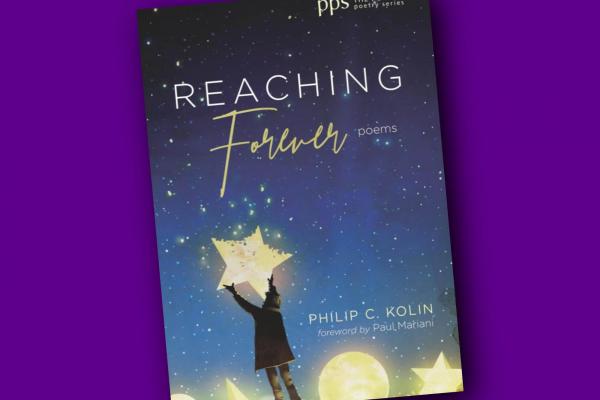HUMANITY HAS BEEN reaching ever since Eve put her hand out and plucked the forbidden fruit. Since then, our acts of extension have been plagued far too often with violence and, in the end, death and despair. Philip Kolin’s new book of poetry, Reaching Forever: Poems, takes on those stretches and examines them with grace. His book is a fresh take on what it means to be loved and loving.
In the poem “God Comes to the Eternal Gate Holiness Church,” Kolin makes short work of people whose reaching is unsuccessful, via one of my favorite lines: “Bystanders down country roads reach out to him.” In other words, the spiritual life is not one for spectators but for those who do God’s will.
Then Kolin describes Judgment Day: how God makes a grand entrance, more splendidly attired than a rock star or royalty. The God who is life encounters God’s people; the divine presence begins the great liturgy, the celebration of celebrations. “Later that evening he will have brought each a rose, and they sigh / Emmanuel.” This is what only the greatest of beloveds can and will do: Gift each believer with the symbol of passion, thus saying in love’s silent language, “You are mine.” What a contrast to those whose reach makes them only bystanders!
Kolin writes of another beloved in his poem “Uncle Kenan Praying at Church.” Likely every parish church has a least one Kenan sitting in the back pew, unnoticed save in the eyes of God. The old man’s prayer of intercession is simple: “he continues to lift each up / for limitless mercy,” for the world speaks “with strange voices.” Finally, the years have whittled down Kenan’s prayer into just waiting for the Lord to come for him.
“But uncertainty is also a catechism,” says the poem “Autumnals,” which speaks to me with poignant urgency. Like many people, I take notice when I read news that a person died, whether they are young or 71, the age I am approaching.
What can I reach for at my age? I wonder.
Kolin answers my question: “But keep your reflections calm—see a pond / become an opalesque canvas.” This is the poet’s invitation to see deeply and thus live more deeply during what years are left to us.
While “carpe diem”—seize the day and reach for every opportunity—is wise advice for the young, Kolin’s gentle speech of the “world yet to be” is a reminder that the world he describes is beyond our reach. It should be, for it is the greatest of gifts: the final healing of the wound our first parents experienced after their misguided choice.

Got something to say about what you're reading? We value your feedback!






